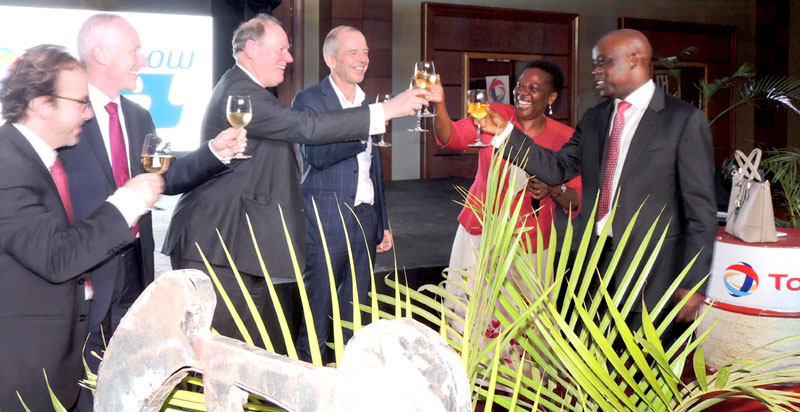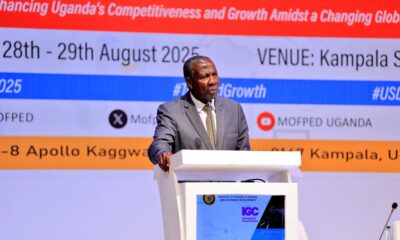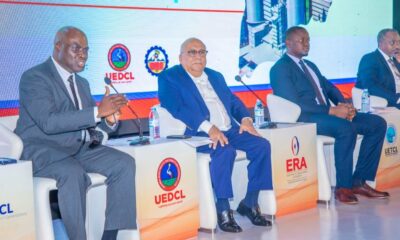Business
UGANDAN OIL: Its time for business now
Government must certify Ugandan workers now or never

Energy minister Irene Muloni toasts to the launch of the FEED study this week with the executives from the Oil Sector. Right is Total’s GM Adewale Fayemi
Uganda has entered one of the most important phases of its oil industry; described generally as the development phase. Estimated to last about four years, it will be characterised by heavy construction activities and this will require the supply of goods and services including steel and metal products, cement, gravel, labour, food, health services, insurance and many others to the major companies that have begun the process of putting in place essential infrastructure to be used in the production phase of oil.
According to experts in the industry, the next four to five years will be the busiest periods in the estimated 30-year lifespan of the long-awaited oil production process for Uganda because this is when companies will be building the most critical infrastructure.
The infrastructure such as roads, camps, pipeline networks including the major 1,444km-long oil export pipeline from Hoima to the Tanzania port of Tanga, are to be built over the coming four years as the country prepares to start producing the oil. Minister Irene Muloni told journalists this week during the launch of a major study to determine the design and cost estimates of the production system for two oil blocks, that the government and other private players are targeting to start producing the oil by the year 2020.
When production starts, fewer jobs will be needed as compared to the next four years when the largest chunk of the construction work will be put in place.
What’s needed?
The government and oil companies agreed to compile an ANNUAL REGISTER of suppliers from within Uganda as well as from around the world to whom the oil companies will send requests to supply goods and services they may need.
And late last year, the newly created Petroleum Authority issued a call to all entities willing to participate in the provision of goods and service to join the register so that they can be considered for contracts by the oil companies.
The Petroleum Authority is keeping the register and interested parties were advised to complete forms that can be obtained from the website of the Directorate of Petroleum www.petroleum.go.ug with the following link. petroleum.go.ug/resourcrs/pau_forms.
The importance of this process was underlined by Dr. Ben Mugasha, Chairman Bemuga group which is one of the local companies that are positioning themselves to provide to services to the Oil companies. Dr. Mugasha says: “It’s high time Ugandans became serious and register their companies to ensure they are able to target these opportunities that are coming. It’s very clear oil is in Uganda but everyone should ask themselves what have they done to take advantage of the process.”
He also stressed the fact that more opportunities especially for majority of Ugandans exist not in directly getting employed by the oil companies but rather as suppliers of a diverse range of quality goods and services to the different companies that will have won contracts to do the work.
“Ugandans should not put a lot of hope in ‘oil money’ [referring to government’s revenue share of the oil proceeds] but think of delivering food to these companies,” said Mugasha.
Mugasha added: “It’s high time political leaders to sensitize their people and see how to benefit from there opportunities. Ugandan companies should come out and not let Kenyans take these chances away from us.”
Minister Muloni also underlined the scale of the work as well as the business opportunities lying ahead by estimating that it could cost about eight billion US dollars. Uganda’s entire annual budget is about 8 billion US dollars.
In 2014, the three major oil companies Tullow, Total and CNOOC that prefer to move under the banner of Joint Venture partners, and a team of officials from government conducted a baseline survey of the needs of companies that will involved in the oil development and production phase.
Getting employment is one of the biggest anticipated benefits from the oil sector. And results of the survey revealed that between 100,000 and 150,000 jobs will be created, majority of which will be indirect or induced jobs such as working on farms or in factories that will supply things like iron bars or chicken to feed the directly employed workers.
Warning not heeded
Whereas the survey highlighted the need for government to put in place a certification or accreditation process especially for the semi-skilled workers, little or nothing has been done to ensure the semi-skilled Juakali workers obtain some certification papers which they can use to apply for jobs.
As the survey revealed back in 2014: “Workers and engineers need to be certified in several disciplines I.e they need to receive an accreditation allowing them to work on an oilfield site.”
In the absence of certification process for the technicians, drivers, engineers, civil craftsmen, machine operators, the recruitment companies will likely be left with no option but import foreign workers from countries such as India, Philippines who have experience working in oil-related operations.
Crucial step on designs and costs commence
The launch of the Front End Engineering Design (FEED) studies at Sheraton Hotel in Kampala this week was hailed as a monumental step towards Uganda’s journey to realise oil.
Energy Minister Irene Muloni said: “This is a milestone in our journey for oil production in Uganda where everyone now is focusing. This FEED will lead to the project execution and construction phase for the upstream facilities required to produce Uganda’s first oil targeted by the end of 2020 which is our mail goal. Several facilities will be constructed such as pipeline to transport oil from Kabale to Tanga, over 11 key roads are to be built as well as two bridges.”
The FEED studies will be carried out by three companies with the aim of determining the technical design of the oil infrastructure, such as pipelines, power infrastructure, as well as the cost of the work before the oil companies can determine whether or not they will fund the exercise.
Two of the three companies that are participating in the FEED study will eventually be awarded the contracts to lay the infrastructure with each company taking charge of its own exploration area. The study is expected to be completed in six months, after which the Joint Venture partners will announce their Final Investment Decision before end of the 2017. The FID is a major step when an oil investor reveals whether or not he will fund the operation.
The three companies that were chosen to conduct the studies are Fluor from France partnering with China Petroleum Engineering and Construction Company (CPECC) from China, Technip from France and Chicago Bridge & Iron Company (CB&I) based in the USA.
Total General Manager Adewale Fayemi said during the signing ceremony at Sheraton that: “The three companies are to work professionally and competitively because only two best companies will be invited for to compete for Engineering, Procurement and Construction (EPC).
The FEED studies will provide the necessary information to fine tune the cost estimate of the project, Identify the specific technical expertise, skills and equipment needed for construction. The performance of these three companies will be critically vetted and analysed by the Joint venture partners.”
Comments


























